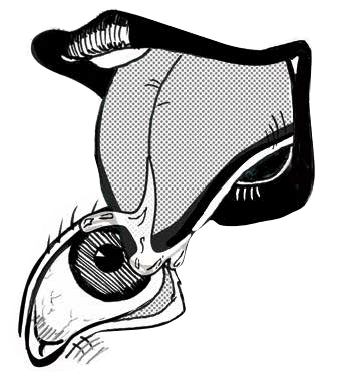Issue:
Steve McClure searches for media mea culpas in reaction to last month’s eye-opening debunking
NOTHING SPOILS A GOOD STORY LIKE THE TRUTH. Although No. 1 last month published an article by Mark Schreiber effectively debunking a supposed “eyeball licking” trend in Japan that had swept through the global media, the mendacious meme in question will likely never die.
Tim Hornyak pointed out in an excellent piece he wrote for tech media website CNET, “I’ll wager that few sites will bother to update their posts about this non-trend, and it will probably remain part of the collective Google mind forever.”
In fact, a Google search for “eyeball licking” produces a mixed bag. Hornyak’s story, in which he recapitulates Schreiber’s No. 1 article and makes some telling comments about the digital media’s pack mentality, comes up first. That’s followed by some other stories citing Schreiber’s demolition of the bogus “oculolinctus” trend, including one on rumor checking site snopes.com.
But slack ass hacks at organs such as The New Zealand Herald as recently as Aug. 8 were reporting versions of the story that made no mention of mythbuster Mark’s tenacious travails on the trail of truth. Scrolling down through the Google search results produces page after page of variations on the original story. It’s like reading a long and depressing charge sheet against contemporary journalism.
Stories about this insidious cyber myth have so far been published in Chinese, Dutch, Italian, French, Spanish, Khmer, Hungarian, Indonesian, Vietnamese, German, Albanian, Czech, Finnish, Russian, Greek, Portuguese and Polish. I find it vaguely comforting that mindless credulity is something we humans have in common, despite our various political, ethnic and religious differences.
By the time I got to page 20 of the Google results for “eyeball licking” I felt like my ocular orbs had been tongued by a moose with halitosis.
Conspicuously absent from the results were any mea culpas from the online heirs to the fine tradition of Grub Street hackdom who rushed lemming like to report this non-story. Checking specific websites, however, shows that some folks are ready to fess up and admit that there’s less to this story than meets the eye.
Well, kind of.
The website of Britain’s Telegraph has a pathetically equivocal paragraph clumsily grafted onto the end of Danielle Demetriou’s June 17 eyeball-licking story, which states: “However, whether the phenomenon is actually real or a fictitious craze invented by the Japanese website, however, [sic] remains unclear. Recent media reports in Japan claim that the original report of eyeball licking among Japanese schoolchildren was a hoax…” The Telegraph then mentions how Schreiber checked the veracity of the original report with various Japanese medical authorities, none of whom had heard about the alleged phenomenon.
The Telegraph does its readers a disservice by relegating Schreiber’s demolition of the story to the category of a “claim,” implying that it has as much validity as the original report. In logic, this is known as “the argument from middle ground.” Wikipedia helpfully describes this as “an informal fallacy which asserts that the truth can be found as a compromise between two opposite positions.”

The Medical Daily website does somewhat better in the mea culpa department. It amended its original story to report Schreiber’s findings in the third paragraph. Website Gawker.com has also added a qualifier to its eyeball-licking story based on Schreiber’s research:
“Though Schreiber, who spoke with the story’s author, was unable to definitively disprove that the activity had taken or was taking place, he was at least able to debunk the idea that the phenomenon was ‘widespread’ among Japanese youths.”
Here Gawker is committing the classic logical fallacy known as “negative proof,” in which a statement is held to be true because there is no proof that it is false.
An even more pathetic example of posterior covering comes from the translator known only as “Beth,” who for the JapanCRUSH site rendered into English a story about the supposed fad that appeared on Japanese website Naver Matome. Schreiber showed how many “news” organizations took the translation at face value, without bothering to check the original story’s veracity (something that “Beth” didn’t do either).
In an online exchange with a poster called “Vadim” calling Schreiber’s exposure of the “story” so much eyewash, “Beth” strikes a paranoid, defensive tone:
“It irritates me somewhat that Schreiber has the audacity to blame me for translating it in the first place, when it was attracting a lot of online attention, and that was the only reason I translated it on what was otherwise a really slow day. . . . Oh, and Mr. Schreiber, who implies that we’re basically sensationalizing Japan, is a serious journalist. His books?
Tokyo Confidential: Titillating Tales From Japan’s Wild Weeklies and The Dark Side: Infamous Japanese Crimes and Criminals. And now he’s trying to make a buck off us, too.”
We have now reached the bottom of the barrel of sloppy logic: the ad hominem attack. And we who labor in the vineyard of No. 1 for little more than our colleagues’ approbation find “Beth’s” comment about “making a buck” amusing, to say the least.
“Vadim” then makes the following sensible comment: “The ‘weird Japan’ trope is so ingrained in the West that one can apparently mystify and sensationalize Japan without really intending to the audience (and ‘media outlets’) will just hear what they want to hear.” But he/she then perversely adds, “On the bright(ish) side, it also means that it’s unlikely that Schreiber’s article will go as viral as the original story.”
So what it all boils down to is a sort of online version of Gresham’s Law: “bad blogs drive out good ones.” Call it the new blog (sub) standard.
Steve McClure publishes the online music industry newsletter McClureMusic.com. He has lived in Tokyo since 1985.

